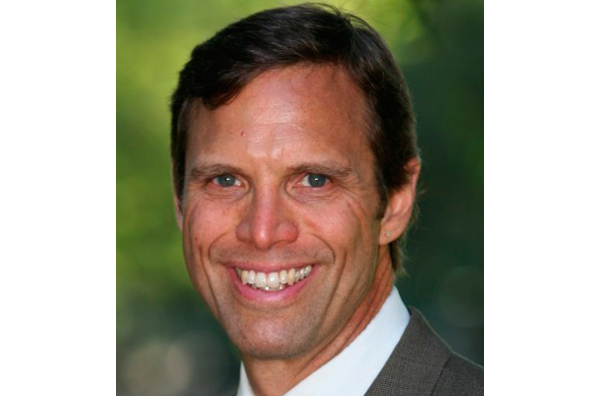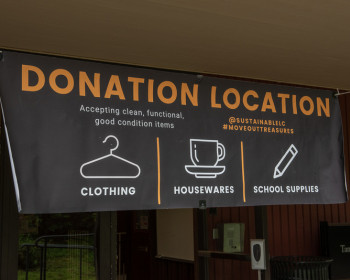Q+A with Sustainability Task Force members clarifies college’s collaborative efforts to be green
Open gallery

At the beginning of the 2010-2011 academic year, Executive Council approved the formation of the Sustainability Task Force and asked the group to spend the year studying sustainability at Lewis & Clark and charting the college’s future sustainability efforts. The Source caught up with task force co-chairs Jim Proctor and Tom Krattenmaker to find out more about the group’s efforts to date and what to expect this semester. Proctor is director of the Environmental Studies Program in the College of Arts and Sciences, and Krattenmaker is associate vice president for public affairs and communications at Lewis & Clark.
What prompted the formation of this task force?
Proctor: We have an opportunity and a challenge here at Lewis & Clark to make a genuine contribution to sustainability. The problem is that the ways people talk about and implement sustainability today have become both all-encompassing and highly restrictive: on the one hand, sustainability means basically everything good we want in this world, yet colleges generally limit sustainability to green campus practices such as energy conservation or food composting. So sustainability has become both conceptually and practically vague: what really are we trying to accomplish, and how best can we do this? As an institution of higher education with an international reach, Lewis & Clark can demonstrate how scholarship is central to answering these questions, and how the answers will stretch far beyond our campus footprint. We’ve had lots of student interest in sustainability and a dedicated Sustainability Council, but we’ve not yet taken this big step forward. Now’s the time.
Krattenmaker: I think Jim is right. In addition to those concerns, what motivated me to take action was the degree to which our reputation has suffered at times from mediocre grades in some of the green rankings and evaluations. We all know that our green reputation is something that attracts students to Lewis & Clark—all three of our schools, actually—and something our alumni are proud of. A perceived failure to live up to our reputation could be harmful to our efforts to advance the College. I have found that these green rankings and other outside factors in higher education are threatening to define sustainability for us, in ways that don’t serve us, our constituents, or our community. I’m keen on seeing us define sustainability for ourselves and telling that story in a way that will be persuasive and influential.
Why is this task force necessary? Doesn’t Lewis & Clark already have a Sustainability Council?
Proctor: The Lewis & Clark Sustainability Council was formed in the late 1990s as the Environmental Council, and though its name changed over time it never expanded its mission. In addition, the circle of participants in the Sustainability Council were highly dedicated but represented only a relatively small fraction of the campus community. So we are looking for recommendations from the Sustainability Task Force that will help us coordinate a wider, more effective breadth of sustainability activities, and involve a wider swath of our faculty, students, and staff. This may in all likelihood involve a reconstituted and reinvigorated Sustainability Council. It’s important to bear in mind that the Task Force will dissolve in May, whereas more lasting mechanisms are required to advance sustainability at Lewis & Clark in the future.
Who is on the Sustainability Task Force and how were they chosen?
Krattenmaker: You might remember the communications we had last fall seeking nominations from the campus community—students, faculty, and staff, and from all three schools. We’ve definitely achieved that broad membership with the roughly 20 people working on the task force now. And partway through last semester our task force got a very valuable new member with the addition of the College’s new sustainability manager, Amy Dvorak. She has been pouring a tremendous amount of energy and expertise into our work. (Ed. Note: a complete list of task force members can be found below.)
What have you been doing to date?
Proctor: Rather than just dive in and start making recommendations, we decided to read and think broadly about sustainability first…that’s the approach we follow in our courses, one we thought wise to practice in the Task Force as well. Our discussions focused on three key topics: the international roots of sustainability in sustainable development, how to go about measuring or assessing sustainability, and, finally, how these considerations apply to college sustainability. At this point we have a much better grasp of the concept, and are starting to form some novel and well-grounded ideas on how we want to implement sustainability at Lewis & Clark.
What are your plans for this semester?
Krattenmaker: This is a finite-duration task force. We owe a report to Executive Council and the campus community by semester’s end, so we’re going to working very hard in the coming weeks. To make the work manageable, we’re dividing ourselves up into seven highly coordinated subcommittees, which are addressing everything from institutional decision-making to campus operations to communications around sustainability. We hope to develop three to six outcomes or goals in each area—goals that we hope are both practical and measurable but also ambitious, even transformative.
How will members of the campus community have a chance to participate?
Proctor: This semester is definitely the time for everyone on campus to get involved, so you’ll be hearing from the Task Force as well as specific subcommittees on a variety of opportunities to participate. We want to get your feedback and commitment around the outcomes we tentatively identify, so that we can move forward together in advancing our mutual understanding and practice of sustainability at all scales of the institution. We expect to interview a number of you, invite you to participate in forums and surveys, and after our draft report is complete we’ll host a big charette on Thursday, April 7, to discuss our recommendations. You may be surprised when we contact you, as you may not see what you do as connecting with sustainability at all; but this is just due to the narrow definition we’ve inherited. So those of you who are working on, for instance, the quality of student life on campus, or our international study programs, or the economic viability of the institution, or development in Africa, Asia, or Latin America, or larger climate policy discussions stretching far beyond our campus are all doing relevant work, and we need your input and participation.
Maybe it’s too early to ask, but what are you two seeing as likely outcomes?
Krattenmaker: You’re right that it’s too early to get into specifics, but at least one big-picture direction emerged when our task force got down to business last semester. It’s quite non-controversial and obvious, actually. As Jim and I mentioned, the term “sustainability” can mean so many things, and it’s been important for us to shape and focus what it’s going to mean for this college going forward. What we’ve seen is that our sustainability work here at Lewis & Clark must be grounded in our educational mission. When you realize that, it becomes a lot easier to sort out which of many possible directions to go in, and how to set priorities.
Proctor: Yes, it’s really odd that a great deal of college-level sustainability has neglected the learning dimension, as if we fully understand it and now we just need to act sustainably. I tell my students that sustainability is like peace: it’s a noble goal, but the path from here to there is understandably complex and challenging. But that’s what learning is for! And we are fortunate to have a highly committed student body and a number of engaged faculty and staff, with a variety of related curricular and co-curricular programs. Now it’s just a matter of pulling together these strengths into a more coherent, effective, innovative effort. It’s a matter of simultaneously “walking the talk” and “talking the walk,” blending action and reflection in modeling the contribution higher education can make toward sustainability. If we do it right, Lewis & Clark will be known as an institution with fresh ideas and effective practices related to sustainability, and this is certainly an outcome worth our time and collaborative effort.
Here is a list of the Sustainability Task Force membership:
Richard Bettega, Facilities
Sandi Bottemiller, Student Life
Beau Broughton, CAS student
Amy Dvorak, Facilities
David Ellis, Vice President, General Counsel
Julia Huggins, CAS Student
Rosa Kim, CAS Student
Tom Krattenmaker, Public Affairs and Communications
Ashley MacKenzie, Law student
Hanna Neuschwander, Graduate School staff
Art O’Sullivan, CAS faculty
Caitlin Piserchia, CAS student
Jim Proctor, CAS faculty
Dan Rohlf, Law School faculty
Amber Shasky ’08, CAS staff
Greg Smith, Graduate School faculty
Nate Stoll, CAS student
Carl Vance, Vice President and Treasurer
Matthew West, IT staff
Janice Weis, Law School faculty
More Sustainability at Lewis & Clark Stories
Sustainability Office is located in Fowler Student Center on the Undergraduate Campus.
MSC: 134
email advorak@lclark.edu
voice 503-768-7794
Senior Director of Sustainability Amy Dvorak
Sustainability Office
Lewis & Clark
615 S. Palatine Hill Road
Portland OR 97219
Office Hours: Thursdays 1 - 3:00 p.m.

